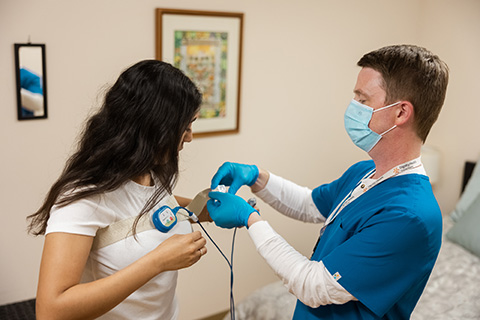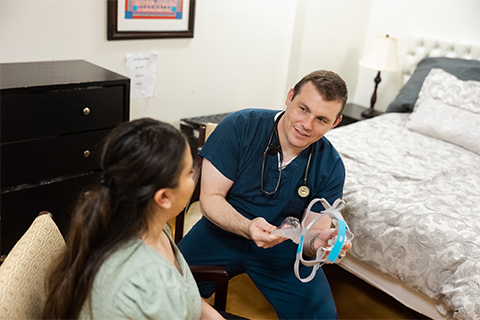
Obstructive sleep apnea (OSA) is a condition where your breathing is interrupted during sleep, often for more than 10 seconds or more at a time, at least 5 times per hour throughout your sleep period. These interruptions are known as hypopneas when your breathing is reduced, and apneas, when your breathing completely stops.
Interruptions in breathing at night typically happen because something is blocking your upper airway, such as your muscles, tongue, or other body tissues. OSA can range from mild to severe, based on a measurement and rating system called the apnea-hypopnea index (AHI). The AHI measures the average number of apnea and hypopnea episodes that you experience per hour that you sleep.
Symptoms of OSA include:
Anyone at any age can have OSA, but it's most common in middle-aged and older adults.
Risk factors include:
Untreated OSA can lead to serious health problems, including Increased blood pressure, memory loss, arrhythmias, and changes in your body's response to insulin and glucose.
OSA is a widespread sleep disorder we regularly handle at RPMA. In many communities, general pulmonologists often act as the go-to sleep specialists since OSA is considered an "airway problem," and its evaluation and treatment are a standard part of pulmonary fellowship training. At RPMA, we specialize in Sleep Medicine and we have accumulated extensive experience in treating various sleep breathing issues. These include patients with OSA, obstructive pulmonary disease, restrictive lung disease, neuromuscular disease, and central sleep apnea (CSA).
Unlike OSA, where the natural urge to breathe remains intact, patients dealing with CSA experience a neurological (central) impairment in their drive to breathe. Treating CSA typically involves addressing the underlying cause since it often serves as a sign or manifestation of an underlying medical condition. Some individuals prone to CSA may have a history of stroke or heart disease or might be taking opiates for chronic pain.
In the field of sleep medicine, we encounter CSA in various scenarios, and not all cases require treatment. For instance, it could be considered normal to observe CSA during sleep onset or after an arousal in a sleep study conducted in a lab. We frequently observe CSA in patients who travel to high altitudes or those recently beginning CPAP treatment for their OSA.
When it becomes necessary to treat CSA, various approaches are available depending on the underlying cause and the patient's specific symptoms. The treatment process must be personalized to cater to each individual's needs.

Tests to Assess Sleep Breathing Disorders may include:
To request your appointment, please call (650) 367-5636 or contact us online today!
Redwood Pulmonary Medical Associates
170 Alameda de las Pulgas
Redwood City, CA 94062
Phone:
(650) 367-5636
Get Directions